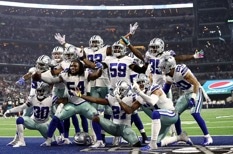Saving versus Investing. What’s the difference? Did you know that the typical person spends more...


Fire up the grill, crack a cold one, and dig your jersey out of the back of the closet because football is back! The Dallas Cowboys 2019-2020 season is upon us, a year where many, including myself, have high hopes that America’s Team will finally be able to make a serious run at their first Super Bowl in 23 years.
In 1989 Jerry Jones bought the Dallas Cowboys from H.R. “Bum” Bright for $140 million. Now 30 years later in 2019 Forbes has named the Dallas Cowboys the world’s most valuable sports franchise at a whopping $5 billion. Despite their Super Bowl drought over the past few decades there are still plenty of financial lessons that can be learned from the Dallas Cowboys.
 If you have ever listened to a press conference with Head Coach Jason Garrett you have most certainly heard him reference “the process” ad nauseam when referring to how the team prepares for a battle on the gridiron. While it may be boring for media members and fans to hear the same mantra over and over, Jason Garrett is right. While results are really what matter in the end in the National Football League, you cannot achieve consistent success without having a set process to help you train and prepare for your opponents.
If you have ever listened to a press conference with Head Coach Jason Garrett you have most certainly heard him reference “the process” ad nauseam when referring to how the team prepares for a battle on the gridiron. While it may be boring for media members and fans to hear the same mantra over and over, Jason Garrett is right. While results are really what matter in the end in the National Football League, you cannot achieve consistent success without having a set process to help you train and prepare for your opponents.
The same goes for personal finance and wealth management. Having a plan and a process of how you want to reach your goals is the first step to pursuing financial success. Although you do not have a 300-pound lineman trying to pummel you into the ground like in a football game, there are still opponents in financial planning that you need to prepare for. Obstacles like taxes, inflation, and market volatility can wreak havoc on your finances if you do not have a coordinated process in place to address them.

Last year the Dallas Cowboys had revenue of $365 million. They do not achieve this level of income by simply selling tickets for fans to watch their football team play. Jerry Jones and Company also make a boatload of money on parking, merchandise, stadium tours, and endorsements. They continually find ways to capitalize on the assets they have to create multiple revenue streams and maximize their financial potential.
You can create this same effect by letting your assets work for you in multiple ways. Although it can feel very secure keeping large amounts of cash in the bank, it can be a huge revenue opportunity left on the table. Letting your money work for you can be critical for many people so they feel they are on the right path toward their financial goals. With interest rates near all-time lows, leaving this cash in the bank or in CDs will not even allow you to outpace inflation, leaving your dollars’ worth less in the future than they are today. Help combat inflation by calculating exactly how much you would like to keep in readily available cash for your emergency fund then put the rest of your money to work for you. This is what we call maximizing the efficiency of your wealth.
 You cannot be a Championship level football team by only dominating one side of the ball. The Kansas City Chiefs led by Quarterback Patrick Maholmes had one of the most dynamic offenses and highest scoring team of all-time last season but they still fell short of reaching the Super Bowl. Likewise the 2018 Chicago Bears defense punished opposing quarterbacks all season but did not have the complementary offense to get out of the first round of the Playoffs. In order to go all the way and bring home the Lombardi Trophy a team needs to be balanced and effective both when they need to put up points and when they need to grind it out in a tough game.
You cannot be a Championship level football team by only dominating one side of the ball. The Kansas City Chiefs led by Quarterback Patrick Maholmes had one of the most dynamic offenses and highest scoring team of all-time last season but they still fell short of reaching the Super Bowl. Likewise the 2018 Chicago Bears defense punished opposing quarterbacks all season but did not have the complementary offense to get out of the first round of the Playoffs. In order to go all the way and bring home the Lombardi Trophy a team needs to be balanced and effective both when they need to put up points and when they need to grind it out in a tough game.
As investors we need to be able to succeed in good markets but also be in a position to mitigate losses when the economy goes through hard times. An effective way to do this over the long term is through proper diversification. Stocks give us the opportunity to participate in gains when the stock market is running while bonds will typically work to provide much needed downside protection when other asset classes fall out of favor.
 The story of the Cowboys last season was them getting a good lead by halftime then squandering that lead and having to battle out a close game. While the Cowboys would have a good game plan going into the game, Head Coach Jason Garrett continually failed to make the halftime adjustments necessary to hold off opposing teams for the rest of the game. While the Cowboys “set-it and forget-it” game plan may have been good enough for the regular season, when facing higher competition this strategy has proven to send the Cowboys packing early ever since Jason Garrett has been running the show.
The story of the Cowboys last season was them getting a good lead by halftime then squandering that lead and having to battle out a close game. While the Cowboys would have a good game plan going into the game, Head Coach Jason Garrett continually failed to make the halftime adjustments necessary to hold off opposing teams for the rest of the game. While the Cowboys “set-it and forget-it” game plan may have been good enough for the regular season, when facing higher competition this strategy has proven to send the Cowboys packing early ever since Jason Garrett has been running the show.
This analogy helps illustrate the need for active management in a portfolio. While you can set a portfolio up for success initially it takes continual observation and management to win long term and in volatile markets. Market conditions and economic factors are constantly in motion so it is important to understand them and adjust your portfolio as the game changes. Rather than sitting on the sidelines clapping and hoping your portfolio succeeds, know when to make a change and actively manage your investments, especially in times of heightened volatility.
 Jerry Jones and the Dallas Cowboys are getting a crash course in leverage as star running back Ezekiel Elliott is holding out from participating in team activities until he gets a new contract. Elliott and his agent know that expectations are high for the Cowboys this season and that the team needs all hands on deck, especially the league’s leading rusher last season, in order to make a run at a Super Bowl. If the Cowboys could easily replace Zeke or if the team was not in position to win right away then holding out and using his leverage would not be nearly as effective and he could run the risk of losing out on some major money by sitting out. Instead it looks like he has management right where he wants them and will lock down a contract worth north of $10 million per year.
Jerry Jones and the Dallas Cowboys are getting a crash course in leverage as star running back Ezekiel Elliott is holding out from participating in team activities until he gets a new contract. Elliott and his agent know that expectations are high for the Cowboys this season and that the team needs all hands on deck, especially the league’s leading rusher last season, in order to make a run at a Super Bowl. If the Cowboys could easily replace Zeke or if the team was not in position to win right away then holding out and using his leverage would not be nearly as effective and he could run the risk of losing out on some major money by sitting out. Instead it looks like he has management right where he wants them and will lock down a contract worth north of $10 million per year.
Good leverage and bad leverage exist in the finance world as well in the form of debt. Good leverage allows you to utilize your assets and cash flow to their potential while bad leverage can continually drain your wealth and leave you playing catch-up for years. A mortgage with a good interest rate can often be looked at as good debt. Having a mortgage allows you to free up a large amount of your assets to be used for other things rather than sitting dormant in your home. Your home still appreciates the same whether you have a mortgage on it or not, currently mortgage interest is deductible on your taxes, and interest rates are often lower that the rate of interest you can gain by investing that money elsewhere.
Credit Card debt is an easy example of bad leverage. Although using credit cards is necessary to build good credit, carrying credit card balances from month to month can be a compounding issue that get out of control quickly. It is best practice to pay your credit card bill in full each month but if you already have a sizeable credit card balance put together a plan to start paying this debt down immediately.
Here at Virtus, we believe that successful wealth management extends beyond financial planning and investing. Wealth management is, by definition, a holistic approach to understanding and providing solutions to all of the aspects of a client’s finances. We believe that by building a solid and valuable partnership with our clients, we can coordinate and unify the decisions in their financial life, so that those decisions complement each other and produce enhanced results. If you would like more information, please feel free to give our offices a call at (817)717-3812.
The information provided here is for general information only and should not be considered an individualized recommendation, personalized investment or tax advice. The investment strategies mentioned here may not be suitable for everyone. Each investor needs to review an investment strategy for his or her own particular situation before making any investment decision. All investing involves risk including loss of principal. No strategy assures success or protects against loss. There is no guarantee that a diversified portfolio will enhance overall returns or outperform a non-diversified portfolio. Diversification does not protect against market risk.